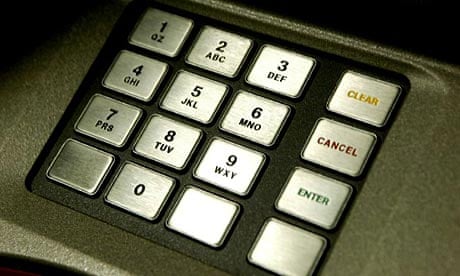Millions of British holidaymakers heading to Spain this summer will be mugged at the cash machine - by the banks, not robbers. Spanish banks are introducing confusing new messages on ATMs which will direct users into pressing "yes" for something called dynamic currency conversion, known as DCC, that will nearly always leave them out of pocket.
Many tourists paying by debit or credit card will already be familiar with shop assistants in Spain asking if you would you like to pay in sterling. It sounds attractive, but Nationwide building society estimates it costs unsuspecting Brits about £5m a month. The exchange rate used is poor and the conversion fee high, with profits funnelled back to the retailer.
Now, after a pilot project by banking group Santander (which owns Abbey), DCC is coming to Spanish ATMs, and the losers will be anybody who thinks they have to press yes to obtain euros from a cash machine. When someone arrives in Spain and puts their cash card into an ATM, after requesting euros, a message will now flash up saying: "You can be charged in GBP." The screen will also include information on the mark-up, exchange rate used and commission rate. It then says: "Press yes for GBP, no for EUR".
Holidaymakers should just press no. As Nationwide (which has campaigned against DCC for several years) says: "We're disappointed to see more and more ATMs operating dynamic currency conversion after the pilot ended, as consumers could increasingly be caught out. When using a cash machine, we understand why consumers would be tempted to transact in sterling, as they'll be able to see how much money they're withdrawing in pounds rather than euros for example - however, the conversion rate used could prove to be very unattractive. Therefore, if in doubt, always opt to transact in the local currency."
Santander sees it in a different light. "At Santander ATMs, British customers are presented with a choice of whether they want to see the amount in pounds or euros. The advantage of seeing it in pounds is that the customer knows upfront exactly how much that transaction will cost, instead of having to wait until they receive their statement at home. They also have a choice at that stage of whether or not they want to go ahead."
Guardian Money carried out a test in Barcelona. We used a Lloyds TSB card to withdraw cash from a Santander ATM. We took €70 out and pressed the no button. Back in the UK, the cost came out as £56.94. Then we withdrew €70 and pressed yes, knowing that as it was a Sunday, there would be no changes to the exchange rate.
This time, we were charged £57.11. We asked Lloyds TSB who took the additional money. "Santander made the additional revenue in this case. We always advise our customers not to convert their transactions into sterling. So, in this case we would advise our customer to press no," a spokesman says. "Our own analysis has shown, and as proven in this example, that using your card in this way is generally more beneficial, although we cannot guarantee this will always be the case."
The difference was not large, but with millions of transactions across ATM networks, DCC soon becomes a big profit earner. If you wonder who is gaining from the switch to DCC, both in shops and at ATMs, take a look at the promotional material sent out by the technology providers that install it.
Travelex promotes DCC to its "business partners", particularly ATM networks. On its corporate website, it tells them: "Capture inbound traveller foreign exchange revenues with DCC."
Fexco, an Irish company that describes itself a "global market leader" in DCC, tells retailers on its website: "Many merchants in the restaurant, hotel, car hire and retail sectors now realise that with Fexco DCC, they ... generate a new revenue stream."
Nationwide says it is concerned that there is still a general lack of awareness among consumers about the costs of DCC, particularly in shops and hotels.
At El Corte Ingles, Spain's biggest department store chain, shop assistants are prompted to ask British buyers if they want to pay in sterling. But when we challenged a shop assistant to explain whether we would be better or worse off, or what exchange rate we'd be charged, we drew a blank.
At least El Corte Ingles seeks consent before applying DCC. Some retailers don't even inform customers.
Nationwide says: "It has become evident that some retailers are not complying with the rules set out by Visa and are applying the conversion service automatically without the cardholder's consent."
So what should holidaymakers do?
· When using a chip and pin card, if the transaction is priced in sterling, ask for it to be changed into euros.
· If the assistant says they don't know how to override the DCC system, ask for the transaction to be voided.
· DCC is only one of the add-on charges at ATMs. Avoid other ATM charges by using a Nationwide Flex debit card or an Abbey Zero credit card, which have no foreign exchange fees.
